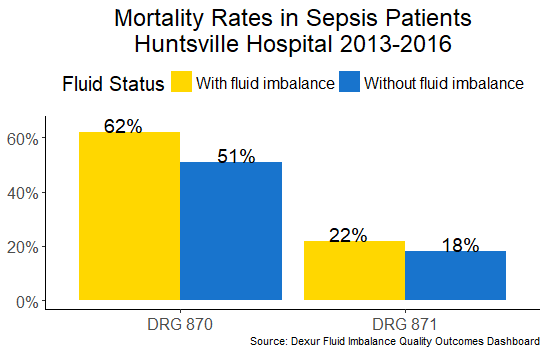How to Evaluate the Impact of Fluid Imbalances on Sepsis Patients: Part 1: Mortality Rates
In Fluid Imbalance
Get Dexur’s Personalized Hospital Specific Presentation on Quality, Safety, Compliance & Education
By: James Pitt Jul. 23, 2018
Fluid balance is a measure of whether a patient has excess, or insufficient, fluid relative to electrolytes. Fluid balance affects mortality in sepsis; early fluid administration saves lives, but later positive fluid balance is associated with higher mortality. According to the nonprofit Sepsis Alliance, sepsis is the leading cause of death in U.S. hospitals. However, it is challenging to assess how solutions to fluid imbalance will improve patient outcomes.
The Centers for Medicare and Medicaid updated its SEP-1 quality measures in February 2018. This was prompted by a study in January that found compliance with the original version of SEP-1 did not associate with lower mortality.
The changes give hospitals more flexibility in how to administer fluids and respond to high lactate levels. (High lactate levels are thought to be a surrogate for tissue hypoperfusion, i.e. inadequate blood flow in tissue, associated with insufficient volume). Fluid administration and lactate had the widest variation under the version of SEP-1 that did not associate lower mortality, so the new version of SEP-1 may better reflect practices that improve sepsis outcomes.
As an example, Dexur analysts examined mortality rates with vs without fluid imbalance for sepsis patients at Huntsville Hospital (Huntsville, AL) from 2013-2016. Fluid imbalance is associated with increased mortality among sepsis patients with major complications and mechanical ventilation for more than 96 hours (DRG 870), and with major complications without extended mechanical ventilation (DRG 871). This data example shows the importance of fluid imbalance management in managing mortality in sepsis patients.

ABOUT THE AUTHOR
